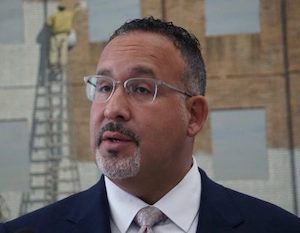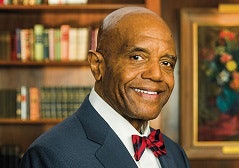As he kicked off the American Council on Education’s virtual annual meeting, which started on Monday, U.S. Secretary of Education Dr. Miguel Cardona’s voice came out garbled at first, his image on the computer screen intermittently freezing.
But the moment of technical difficulties felt “symbolic” of what he wanted to address, he said, the educational inequities highlighted by the pandemic, like the digital divide.
“This is a perfect example … of what our students are facing,” Cardona told administrators and educators.
 Dr. Miguel Cardona
Dr. Miguel CardonaHe noted that students aren’t just struggling with broadband access but also their own emotional and “cognitive bandwidth” as they face basic needs insecurity, job loss and the trauma of losing family members. Meanwhile, a typical student today isn’t “your typical college student you might think of twenty or thirty years ago,” he added, with increasing numbers of student parents or full-time workers, who face extra obstacles to their education during the pandemic.
“This is our opportunity as a country to make sure we … intentionally design, our higher education institutions to meet the social-emotional needs of our students, the mental health needs of our students,” he said.
Cardona’s hope for the fall is to set a “higher bar than just reopening.”
“If our goal is to re-open to where we were, we’re going to miss the opportunity to close major gaps in achievement that existed already, major gaps in access that existed before the pandemic that were worsened by the pandemic,” Cardona said. “For me, it’s really an opportunity to reimagine what higher education can be for students that are coming through the pipeline now.”
He described minority-serving institutions, like historically Black colleges and tribal colleges, as partners in that work and schools that will “prominently” figure into the department’s higher education agenda.
In general, Cardona emphasized the need for “more than symbolic partnerships” with higher education institutions to incorporate true “input from the field” in crafting policy decisions on issues like student loan debt relief, gainful employment and changes to Title IX regulations.
College and university leadership also discussed their role in critical conversations like these, especially around civic engagement and racial justice.
 Dr. Ronald A. Crutcher
Dr. Ronald A. CrutcherDr. Ronald A. Crutcher, president of the University of Richmond and chair of ACE’s board of directors, said that as a Black higher education leader, he’s increasingly vocal about racial justice issues in higher education.
He serves “a campus seated in what was the heart of the capitol of the Confederacy” that, with time, has grown “much more diverse,” Crutcher said. “My challenge to the community was to use that rich diversity to change the culture but also to ensure that we not only developed a diverse community but an inclusive community, a truly inclusive community where people from all backgrounds and experiences could learn how to navigate their differences, learn how to bridge those differences and interact with each other.”
Creating that dialogue among students is hard work, noted Dr. Ashish Vaidya, president of Northern Kentucky University. For example, he pointed to social media as an arena of “hurt and damage” rather than fruitful discussion across divides.
For Crutcher, part of that process of creating dialogue is teaching students civic engagement.
“… Unfortunately what happens, when students are feeling hurt and pain – students of color, first-generation students – our faculty wrap our arms around them, and then we leave them there,” Crutcher said. “What I say is that you have to support the students, but we have a role to play to help them somehow figure out how to come up with counter speech, by protesting.”
“We have some students who are protesting right now – more power to them,” he added. “I did that when I was in college. They’re protesting against me. That’s fine – that’s what they’re supposed to do. But we can’t allow them to stay at that place of hurt and powerlessness. Otherwise, we won’t be serving them well when they graduate from the university.”
He also described presidents as having a civic engagement role themselves, especially after the “wake-up call” of the murder of George Floyd, a Black man killed by police in Minnesota.
“I have seen tremendous interest in working on some of the root cause issues,” he said. “It takes all of us working at it. It can’t be only Black folks. We need allies as well.”
Cardona also stressed the importance of university leaders as changemakers for a more equitable higher education system and a more equitable society as a whole, especially amid the pandemic.
“Leadership is hard,” Cardona said. “There is no playbook for this, but it is our responsibility. And we have to lead with a sense of urgency around these issues. The pandemic has really sharpened our swords for the real fight of inequities, the real fight of addressing a system of have and have nots. Who better than us as leaders in education to say we’re going to make the tough decisions, we’re going to make often unpopular decisions to make education that place where all students have access … giving opportunities to those that have been marginalized and pushed aside. That’s what our country needs right now, strong leadership.”
Sara Weissman can be reached at [email protected].



















